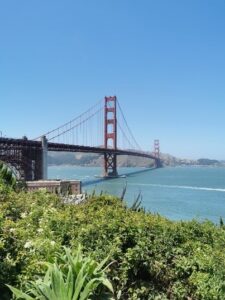Schlagwort: ‘PhD’
My Research Stay at Stanford University
- PhD Candidate for Product Engineering of E-Mobility Components
- USA, Stanford
- Stanford University
- 06/2025 – 11/2025
Preparation and organization of the stay
I am currently a fourth-year PhD candidate at the PEM at RWTH Aachen University. From early on in my academic career, it was a clear personal and professional goal to spend part of my doctoral studies abroad. During my Master’s degree, this plan could not be realized due to the COVID-19 pandemic, which made international research stays largely impossible at the time.

©International Office
As a result, I continuously sought opportunities later on and remained in close exchange with professors and group leaders from relevant research groups in the United States. These discussions helped me sharpen my research interests and identify potential host institutions. Ultimately, a combination of persistence and good fortune led to an exciting opportunity at Stanford University, where I was offered a visiting research stay within the STEER research group.
Following the initial contact, the process moved forward very quickly, and I received an official invitation from Stanford. A particularly positive aspect was the excellent administrative support on the host side: a dedicated contact person at the department guided me through all formalities, including visa-related questions and institutional requirements. This support significantly reduced the bureaucratic burden and made the overall process smooth and manageable.
In parallel, I applied early for on-campus housing through Stanford’s internal housing lottery system. Although I was not allocated permanent housing through this route, I was able to secure two consecutive sublets directly on campus. This required some flexibility and a bit of luck, but it was strongly facilitated by an active and supportive German community at Stanford. In this context, I can highly recommend joining relevant community groups or chat channels, as they are extremely helpful for housing, administrative questions, and general orientation.
Regarding financing, a small portion of the travel and stay expenses could be covered through my research project, with explicit support from the project sponsor. Institutionally, the entire stay was handled as an extended business trip, which simplified internal approval processes and reimbursement procedures.
Overall, the preparation phase required initiative and coordination but was greatly eased by strong institutional support on both sides, proactive networking, and early planning – especially with respect to housing and administrative requirements.
First steps after arrival in host country
My stay effectively started immediately after arrival. I was able to move directly into my sublet room, which was located on campus at Stanford University. This proved to be extremely convenient, as it allowed for very short walking distances to all relevant facilities, including offices, laboratories, and shared infrastructure.
Since I was not enrolled as a regular student, I did not have to select or attend any courses. Instead, I was able to start my research activities in the host research group right away, without any delay. Administrative formalities, such as obtaining a student or visiting researcher ID card and access credentials, were handled very efficiently and could be completed within a single day.
One practical recommendation that cannot be overstated is to obtain a bicycle as early as possible. University campuses in the United States are typically very large and spatially cohesive. Compared to Aachen, distances are significantly longer, and daily mobility without a bike is impractical. A bicycle quickly became an essential part of everyday life and greatly improved flexibility and efficiency on campus.
Academic experience
I was officially registered as a Visiting Student Researcher at Stanford University. In this status, I was neither required nor formally allowed to enroll in regular courses for credit. However, in coordination with the respective principal investigators, it was possible to sit in on lectures and attend courses informally. I would strongly recommend making use of this opportunity, even if it is not mandatory.
The teaching quality at a university like Stanford is exceptionally high. Courses are very well structured, clearly motivated, and highly engaging. Beyond their academic value, some lectures are also extremely beneficial from a personal and professional development perspective. A particularly striking example was the course “Personal Finance for Engineers”. The way financial literacy, personal finance, and investment strategies are taught to engineering students is exemplary and forward-looking. This is an area that, in my view, should receive significantly more emphasis in engineering education in Germany as well.
In terms of social and academic integration, the German community at Stanford plays an important role. It is the second-largest international community on campus, which made integration very easy. I was warmly welcomed and quickly connected with like-minded people, both academically and socially. This network not only facilitated everyday life but also enabled valuable exchanges on research, career paths, and life in the US more broadly.
Overall, despite not being formally enrolled in courses, the academic exposure, high-quality teaching environment, and strong community integration resulted in a highly enriching professional and personal experience.
Financing
The research stay was financed primarily through private means, supplemented by funding from my ongoing research project and the support of the RWTH Ambassador Scholarship. This combination made it possible to cover the essential costs associated with the stay, including travel, insurance, and part of the living expenses.
It comes as no surprise that private universities in the United States – and especially in the Bay Area – are associated with very high costs. As a visiting researcher, I was required to pay a monthly university fee. In addition, general living expenses, particularly for food and daily necessities, are significantly higher than in Germany. Housing costs also represent a substantial share of the overall budget, even when living in shared or sublet accommodations.
Nevertheless, the stay is absolutely manageable from a financial perspective with appropriate planning and funding support. More importantly, it should be viewed as a strategic investment in one’s own education and professional development. The return on this investment – through academic exposure, international experience, networking, and personal growth – is exceptionally high and, in my assessment, clearly justifies the associated costs.
Leisure

©International Office
California is, quite simply, breathtaking. This is often said – but experiencing it firsthand truly confirms it. The diversity of landscapes along the US West Coast is remarkable, ranging from dramatic coastlines and deserts to mountains and forests. Combined with the consistently pleasant climate throughout most of the year, California offers exceptional conditions for outdoor and leisure activities.
One absolute highlight – and a clear recommendation for anyone spending time in the region – is visiting the national parks. They are unique on a global scale and offer experiences that are difficult to compare with anything in Europe. In particular, trips to Yosemite National Park, Sequoia National Park, Kings Canyon National Park, Death Valley National Park, Joshua Tree National Park, and the Grand Canyon are strongly recommended. Each of these parks is distinctive in its own way – whether through scale, geology, climate, or biodiversity – and all are truly unforgettable.
What added value did the stay have for my career prospects?
For me personally, the stay was particularly valuable due to the different working culture and the strong attention to detail within the host research group at Stanford University. The way research questions were approached – often with a high level of precision, openness, and constructive discussion – was both refreshing and intellectually stimulating.
The people I worked with were, without exception, highly interesting personalities with very diverse and inspiring backgrounds. This diversity of perspectives significantly enriched daily research interactions and broadened my own way of thinking. Beyond the immediate academic collaboration, one of the most lasting outcomes of the stay is the international network that emerged and continues to exist beyond the exchange itself.
At the same time, the exchange was not a one-way transfer. Through my own research background and prior project experience, I was able to contribute concrete technical expertise and practical insights to the group on site. This mutual exchange of knowledge and perspectives was a key strength of the stay.
On a broader level, California and Germany share more similarities than is often assumed, particularly with regard to innovation-driven industries and technology ecosystems. This is especially true in my field of work, the battery industry, where comparable ambitions exist in terms of sustainability, industrial scaling, and technological leadership. Many of the approaches, mindsets, and organizational structures observed in California offer valuable learnings that should be examined more closely and, where appropriate, adapted for application in Germany.
Especially in the current politically turbulent times, it is becoming increasingly important to identify partners with shared values and to strengthen cooperation with regions such as California. Building closer ties in strategically relevant technology fields can help enhance resilience, innovation capacity, and long-term competitiveness – benefiting both individual researchers and society as a whole.
To what extent does my stay abroad have a sustainable character?
The stay abroad has a clearly sustainable character, as the exchange of experience and knowledge extends well beyond the physical duration of the visit. The professional and personal connections established during the stay continue to enable ongoing scientific dialogue, informal consultation, and mutual learning over time.
Conclusion
I can wholeheartedly recommend such an exchange stay to anyone considering it. Despite the organizational and financial challenges involved, the personal and professional benefits clearly outweigh the costs. One should not be discouraged by the financial effort required – when viewed in the context of long-term career development, the investment is more than justified.
My Research Stay at UC Berkeley
- PhD Candidate for Electrical Engineering
- USA, Berkeley
- University of California, Berkeley
- 05/2025-08/2025
- Preparation and organization of the stay:
I am currently in my final year of my PhD at the Center for Ageing, Reliability and Lifetime Prediction for Power Electronics and Electrochemical Systems (CARL), RWTH Aachen, where I work on analyzing the aging mechanisms of batteries using experimental and simulation-based data. Battery research is highly interdisciplinary, combining knowledge of electrochemical processes, experimental setups, engineering, and data analysis. Spending part of my research abroad had always been very important to me, as it offered the chance to gain new perspectives and access complementing expertise for my research. The energy, controls, and applications lab (eCAL) at UC Berkeley, with its expertise in algorithms, lifetime analysis, and data-driven methods, complemented my background and offered the expertise I needed for my analyses. To prepare for my time there, I organized the battery aging measurements I had started at RWTH Aachen so that they could be analyzed once I arrived at the lab. A professor at my institute from RWTH Aachen put me in contact with my host supervisor.
Organizing the logistics of a research stay in the US can be challenging. Finding accommodation in Berkeley on short notice was not easy, so I opted for an Airbnb, while shared apartments or nearby cities like Oakland offered more affordable alternatives.
- First steps after arrival in host country:
By chance, my first day at UC Berkeley coincided with the annual eCAL retreat, where we went lawn bowling and had dinner afterward. It turned out to be the perfect way to meet the whole group in a relaxed setting and to get to know the PhD students right away. Everyone was very welcoming, and a few of them gave me a tour of the lab. I also met my host professor in person that day, which made it easy to settle in and feel like I could start my research stay right away.
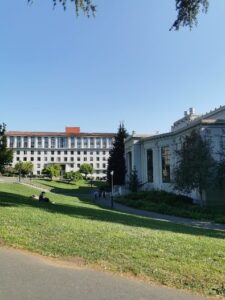
Campus of UC Berkeley
©Katharina Quade
- Academic experience:
eCAL had the feel of a close-knit group: about ten PhD students worked under the supervision of my host professor, supported by a handful of bachelor’s and master’s students. The culture and PhD process at UC Berkeley was noticeably different from what I was used to in Germany. At RWTH Aachen, PhD students often supervise theses and work closely with student assistants, whereas in Berkeley the emphasis was much more on individual projects and dissertation work without relying on large infrastructure and equipment. This meant fewer administrative and organizational duties for the PhD students at UC Berkeley, allowing researchers to focus deeply on their own topics. Each environment had its own strengths and weaknesses, and this exchange gave me the opportunity to integrate the strengths of the US PhD system into my work at RWTH Aachen.
The lab’s relatively small size made it easy to settle in and even though the students were spread across different campus buildings, communication was open and effortless. eCAL was also highly international, with students from a wide variety of cultural backgrounds. This diversity enriched our exchanges, blending technical discussions with cultural perspectives and insights into PhD programs.
- Financing:
The cost of living in the US, especially in the Bay Area, is quite high, covering groceries, leisure activities, and daily expenses. Fortunately, I lived close to a Trader Joe’s, which offered relatively affordable groceries. Getting to San Francisco on the weekends was very convenient thanks to the BART train, while within the city, buses and the metro were the main public transport options. For trips outside the Bay Area, having a car is essential. Renting a car in the US is comparatively affordable, but it requires a credit card.
-

The Golden Gate Bridge on a sunny day. San Francisco is just about 30 minutes away from Berkeley by train.
©Katharina QuadeLeisure:
Berkeley itself is a relatively small city in the East Bay, and since my stay took place during the summer semester, both the campus and the city were fairly quiet. Overall, I really enjoyed Berkeley and San Francisco as the area has a lot to offer, both culturally and culinarily. I visited Alcatraz, explored several exhibitions, and had excellent food in Chinatown and Little Italy. One thing to keep in mind, though, is the microclimates in the bay area: it can quickly turn cold, windy, or foggy.
California’s landscapes are incredibly diverse, and it is the US state with the most national parks. Many of them are accessible from the bay area, though usually a car is necessary. During my stay, I was able to visit Yosemite, Sequoia, Redwood, and Death Valley National Parks, each was impressive in its own way. I was particularly fascinated by how different the scenery can be within a single state: from the forests of Redwoods and Sequoias to the dry, hot desert landscapes of Death Valley.
- What added value did the stay have for my career prospects?
My research stay abroad was an important step for my professional development. It allowed me to work in an international research environment and gain insights into different academic cultures and PhD systems. I strengthened my expertise in advanced battery data analysis and honed my ability to work in interdisciplinary, multicultural teams. Global issues like climate change can only be addressed collectively, and this experience highlighted how much progress depends on collaboration across borders and disciplines.
- To what extent does my stay abroad have a sustainable character?
My stay abroad had a lasting impact in several ways. Beyond my own research, I built professional connections with professors, startups, and companies at UC Berkeley, creating opportunities for future collaboration. Networking is crucial in academia, and I am confident these contacts will remain valuable. I am still in touch with several PhD students and look forward to meeting them again in the future.
- Conclusion:
My time in California was definitely both professionally and personally rewarding. Engaging with students from diverse countries brought new perspectives to my work and daily life. Most importantly, the stay allowed me to focus and collaborate intensively on my research, which was crucial for successfully completing my PhD and ultimately deepened my passion for science and research.
My Research Stay at the University of South Carolina Upstate
- PhD Candidate in Business Economics
- USA, South Carolina
- University of South Carolina Upstate
- 09/2024 – 11/2024
Preparation
I had been a PhD student at RWTH Aachen for a few years and working abroad had always been something I’d like to do. As part of my research, last year I had the opportunity to start collaborating with a professor from the University of South Carolina Upstate. When I asked for the possibility to visit the US and work together from there, she was on board immediately. So, the planning began…
Planning a trip to the United States is definitely an administrative task, and I quickly realized that I had to take it step by step. After settling on a rough timeframe with my PhD supervisor and my hosting professor, I contacted the travel department of the university and booked my flights to and from the US. Talking to colleagues who had already been abroad and looking up to-do lists online was very helpful to figure out what steps to take, e.g. requesting a letter of confirmation from the host university or getting an international license. I started the organization process half a year before my stay, which was a convenient timeframe to organize everything.
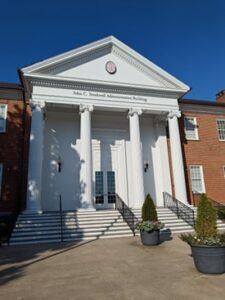
Main building of the University of South Carolina Upstate. ©Maren Paegert
Accommodation & Living Expenses
Living expenses in the US are higher than in Germany, especially food prices. Eating out will cost around $ 20-30 for one meal. Grocery prices can be two to three times as expensive as in Germany, even for things like bread, a package of cheese, or some chocolate. This is just something to know and budget for. For my stay, I applied for and got granted the RWTH Aachen Research Ambassador Scholarship, which helped in covering some of those expenses.
As for my accommodation, I ended up booking an apartment in a complex which was specialized in short-term leases for extended business stays. I would recommend to book directly over the apartment’s website, since I experienced a cancellation several days after booking over a third-party platform. Other good options for a stay in the US are Apps such as Airbnb. In my case, there was no student housing available, but that would be another option in general.
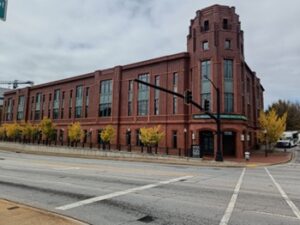
College of Business and Economics. ©Maren Paegert
Everyday Life and Research Stay
I had my own office at the guest university and was able to experience everyday working life in the United States. Overall, working as Academic staff in the US is quite similar to Germany in many ways, with some cultural differences.
Also, I stayed in one of the Southern States of the US, and Southern hospitality is something I definitely experienced! Everyone was very friendly, open and attentive, which I enjoyed a lot. The professor I worked with was a great host, and I quickly met some amazing colleagues. The area offered a lot of places to explore, and I enjoyed walks in the park, going out for meals, shopping, the cinema, going to the gym, and running. One of my favorite experiences is that I was able to give my own lecture at the university and get into contact with many very curious students.
Another highlight was the last week of my stay, when we attended a conference in Virginia and I presented our research there. Overall, meeting an international community and collaborating was a very rewarding experience.
Conclusion
I can highly recommend to work or study abroad for a while. If that has been on your bucket list for some time, like in my case, be proactive and just do it!
Helsinki – A truly livable, diverse and exciting city
- Materials Engineering, PhD
- Helsinki, Finland
- Aalto University
- April 2022 – July 2022
At the end of 2021, I have decided to spend three months on a research stay at Aalto University in the Finnish capital. Finland has attracted me for quite some time. It appealed to me to learn how people live in the northern countries of Europe, how the much-praised education and social system works, and what it’s like to live with 20 hours of sunshine a day. The opportunity for the research stay came about through a long-term collaboration with Aalto University.
I found out more about Helsinki through former student colleagues and friends. They suggested me to apply for a room in one of the many student dormitories. Everyone recommended the student agency HOAS. Through HOAS I got a cheap room in a 6-person shared flat. Only exchange students that studied in Helsinki for a semester were accommodated in my apartment building. This meant that we always spent a lot of time together. Whether it was going to the sauna, having dinner together or kayaking in the early evening, there was always something going on. However, it takes much more effort to get in closer contact with Finnish people than with internationals. Therefore, I joined a soccer club at the beginning of my stay and thus came into exchange with the locals. It is also possible to meet the locals in everyday university life, but you should be aware that building a friendship is not as easy as in other cultures. Nevertheless, you can learn a lot from the Finns. I found it impressive with which composure things were accepted and how pragmatically solutions were found. Moreover, I had the feeling that Helsinki is a city for all people. A very good public transport network, a developed bicycle path system, clean barbecue areas and public saunas. In addition, the low crime rate makes Helsinki a very livable city.
In particular, the public library Oodi, where, in addition to the possibility of borrowing books, there are also offers for young children, video games, workstations, sound studios, 3D printers and much more. A place for young and old; rich, and poor. A place for exchange across social classes and age boundaries. Very impressive!
From Helsinki you can also visit the Estonian capital Tallinn. The crossing by boat takes just 2.5 hours and costs less than 10 euros per trip. There you can see the influence of the European Union: Neighborhoods are being modernized, digitalization is being pushed hard, infrastructure is being expanded. For me, the contrast between the old Soviet structures and the influence of European ideas was very exciting to observe. While older people spoke Russian and Estonian in the markets of the Estonian capital, English was clearly heard more often among the younger generation. Young people wanted to belong to the EU and be a part of the idea of a common Europe.
Finns like distance and in this case, it has nothing to do with the pandemic, but it is a good habit not to get too close. There is one exception, however: the sauna. In saunas, Finns are very talkative, moving close together to make room for everyone. It’s a place for socializing and sharing, and I’ve spent a few evenings there with colleagues, roommates, and new friends.
In summary, I can say that the Finnish capital is truly livable, diverse, and exciting. I am glad and grateful to have been given this opportunity for a research stay. Finally, my personal advices for staying in Helsinki as a student: live in HOAS dormitory, buy HSL-City Bike subscription (35 euros for 6 months), visit the beach on Pihlajasaari, go kayaking, go to Tallinn, eat cheap sushi, spend time in Oodi, discuss with Finns in the sauna, spend long summer nights at public barbecue places, drink cheap beer in Kallio district and try Finnish salmon soup.
Creating countless memories in Dublin, Ireland
- Electrical Engineering and Information Technology, PhD
- Dublin, Ireland
- University College Dublin
- 01.09.20221 – 28.02.2022
Preparation/Internship Search:
Since my early bachelor’s days, the prospect of studying abroad has been tempting and fascinating to me. However, during my undergraduate, I couldn’t find the right time to study abroad. With the start of my PhD at RWTH Aachen University, I approached my professor with the idea of a research visit. He liked the idea and initially suggested a research visit in the latter half of 2020. With the COVID-19 pandemic eventually bringing everything to a stand-still, we postponed further preparation to early 2021. Despite the still ongoing COVID-19 pandemic, we went on with my professor getting in touch with a colleague of his at University College Dublin who works on similar topics as my chair back at RWTH Aachen University. The professor at University College Dublin was quickly convinced of such a research visit, mutually benefiting both institutions with the prospect of closer collaboration and exchange in the future. The general timeline was set from this point in time, and we entered the second stage of planning my visit. Luckily my stay as a visiting researcher was independent of any undergraduate curricular or requirements (e.g., proof of English, certain average GPA, etc.). Thus, the only thing that University College Dublin required was to fill out one form to register as a visiting researcher officially and have these documents signed by my professor. As such, any kind of tuition fees, which are common to be paid at Irish universities, were waived. At RWTH Aachen University, a little bit more preparation was involved. Firstly, we had to officially apply for a leave from my duties as a scientific assistant. Secondly, we contacted the International Office and prepared all documents for the ERASMUS+ Internship application. Closer to the start of the research visit, I was eventually able to register myself with University College Dublin. The process itself was very smooth and didn’t take much time.
Apartment search in Dublin:
Being used to the “cheap” cost of living in Germany, searching for apartments in Dublin might come as a shock. The average price for renting is much higher than in Germany (typically two to three times higher for a shared living), with landlords typically renting for one year or more. In the case of private dorms renting is based on a trimester basis (meaning only for four or eight months). Hence, finding a cheap place for just half a year is quite challenging. Despite University College Dublin offering a housing program, the prices rank on the same level as renting from private landlords/companies. Furthermore, due to my somewhat late application, I could not get a place in the housing program at University College Dublin. Eventually, I settled with a mixed approach, living in an expensive private dorm for the first four months in the city center before moving in with a few colleagues for the last two months close to University College Dublin. Usually, it is required to pay the whole renting sum (>several thousand) in a student dorm before moving in as monthly payment rates are only offered for long-term rents.
Commuting/Travelling in or around Dublin:
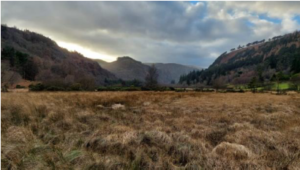
© Alexander Meyer
Transportation in and around Dublin is mainly limited to bus service only. There exist two metro lines called the Luas, respectively the green and the red line serving some parts of the city. Nonetheless, typically buses are the go-to option. To commute to University College Dublin, only buses are available with frequent schedules along the major routes. Especially during the morning and the evening, delays and disruptions in the rush hours are to be expected as most traffic is funneled through the highly congested city center. The Google Maps app proved to be the most reliable for accurate prediction of bus arrival times. Worth mentioning is the leap card used for all transportation in Ireland, as typically only a leap card is accepted as a form of payment. These can be bought at many shops and charged via NFC using an app on your smartphone. Additionally, students are entitled to get a Student Leap Card, offering lower fares for daily commuting. Nonetheless, even the reduced student fares for transportation/commuting to and from university/somewhere are much higher than in Germany. Besides public transport, many taxis exist that can be conveniently called and paid using the FreeNow app. Typically, taxis can be called via the app in less than five minutes, even outside the city center. Also, taxi rates are fixed and much lower compared to Germany, making it a favorable option, especially late at night. However, during the closing hours of bars and pubs during the weekend, getting a taxi can be tricky with the FreeNow app malfunctioning or taxi drivers picking up people on the street directly without relying on the app.
Daily Life:
Daily life in Dublin is not much different from any major city in Germany. Shopping for groceries/daily necessities is very convenient with various supermarkets/local shops such as Lidl, Aldi, Tesco, SuperValu, Centra, or Spar, to name a few, to be found everywhere in Dublin. Prices are not much different from Germany and can be generally categorized on the same level. Only ordering products online might take more days for delivery as most are brought in via the United Kingdom or France. Also, ordering food from all cuisines is very convenient, with a large variety to choose from with prices typically lower than dining in restaurants.
Health Insurance/Telephone/Banking:
My health insurance covered me during my visit at no extra cost. With the newly introduced regulations on roaming charges for mobile carriers by the European Union, I simply continued using my existing contract. However, with extra costs imposed on regular phone calls, I generally placed calls via Whatsapp or FaceTime to avoid being charged extra. Finally, I also continued using my bank account at no extra charges for banking. Contrary to Germany, a debit/visa card is typically accepted, so there is no need to carry cash in Ireland. To transfer money between friends, generally, Revolut or Paypal are the preferred go-to-apps.
Research:
During early talks with my professor/supervisor at University College Dublin, we had only agreed on a general outline for the research visit. Upon starting my research here at University College Dublin, I was offered various opportunities to work on exciting projects within the scope of the initial agreement. As there was no mandatory coursework to complete, I could solely focus on research, enjoying a high degree of autonomy and freedom. Whereas my work was primarily focused on simulation and developing models, now and then, measurements in the lab needed to be conducted. Also, publication and revision of the latest results were a significant part of my work, where I could benefit from the extensive knowledge existing in the group already. To keep in touch with my supervisors, there was a group meeting held every week in which the latest results/news about the chair and each PhD’s work were discussed, and a short report was submitted to the professor. Additional meetings were held whenever necessary. At University College Dublin, I had my own cubicle space, sharing a large office with all my fellow PhDs in the same group. There I was provided with all the resources required to conduct my research. Additionally, due to the open workspace culture, it was straightforward to get in touch with my colleagues and make new friends at work. With PhDs joining from across the globe, the group was very international, with people of various backgrounds, cultures, and an open-minded orientation. Consequently, besides working together on inspiring projects, we bonded over various social events on the weekends.
Leisure in Dublin:
With some restrictions on pubs and restaurants eased at the beginning of my stay, I got a chance to enjoy Dublin’s extensive pub and restaurant culture. Wherever you wander in Dublin, one can be sure to find a cozy place offering a pint of Guinness or some proper, triple-distilled Irish whiskey and some Irish band playing traditional music in the background. Generally, pubs and bars close around 2 am to 3 am, so somewhat earlier compared to Germany with bookings for large groups required for most places partly due to the COVID-19 restrictions that were in place. Nonetheless, the nightlife in Dublin is truly unique, where countless memories have been made. Besides the high congestion of pubs, bars, and restaurants, Dublin offers many places to visit. Among these, the most touristic ones are the Guinness Store House, telling you the origin story of Ireland’s most famous beer while enjoying an incredible view across Dublin in the rooftop bar. Or the many distilleries that offer tours and tastings such as the Teeling, Jameson, or Roe & Co distillery. Also, from a cultural point of view, Dublin has many theaters, museums, or galleries to offer. Being the capital of the Republic of Ireland, also many government buildings can be found throughout the city.
Exploring Ireland:
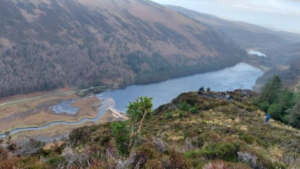
© Alexander Meyer
Besides working on my research during the weekdays, I tried to travel across Ireland/Dublin as much as possible. These travels were attainable despite the ongoing restrictions due to the COVID-19 pandemic, which were eventually lifted entirely to the end of my research visit. During these trips, I encountered a beautiful country with very friendly people along the way. Around Dublin, countless opportunities for hikes exist, which can be easily reached using public transport. Various trips lead me to Howth, Bull Island, or Phoenix Park in the north of Dublin or Dun Laoghaire, Killiney, Bray, or Greystones in the south of Dublin. All beautiful places which can be easily explored during on a day trip accompanied by many lovely restaurants and cafés at every spot. The most beautiful spot I encountered during my travels was the hike in the Glendalough Mountains in Dublin’s neighboring Wicklow County. Located in a natural reserve, one can truly experience and appreciate Ireland’s nature. Furthermore, trips to, e.g., Galway, Limerick, or Cork are highly recommended and can be easily reached using Irish Rail.
Conclusion:
Summing up, I genuinely enjoyed my time in Ireland. While working on exciting projects during the weekdays, the weekends were left for many exciting activities, and I enjoyed plenty of nights wandering Dublin’s nightlife with friends. Throughout my stay, I have made many new friends from across the globe, both at work and in my student dorm. Despite the high cost of rents, I would highly recommend staying at shared living at one of the plenty dorms, at least at the beginning, simply to meet many new people from all over the world. New friendships have been made, which I hope will last a lifetime. The Irish are very friendly people surrounded by a beautiful landscape that invites for countless hikes and trips in the greater Dublin area or beyond.


